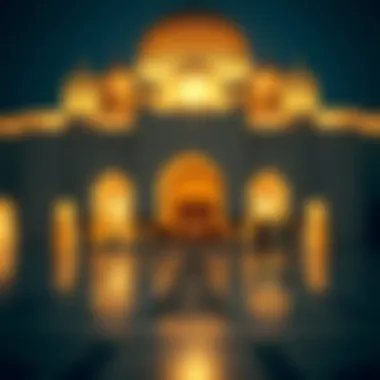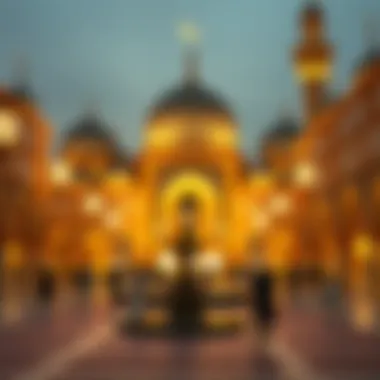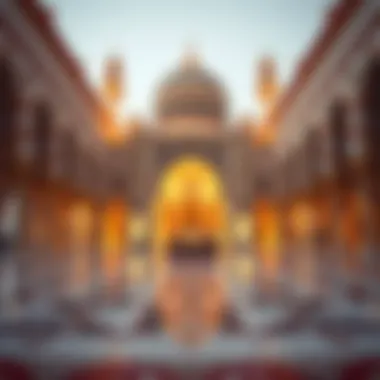Understanding Ramadan in Dubai: A Complete Guide


Intro
As the sun sets over the skyline of Dubai, the vibrant city transforms into a place of spiritual reflection and social gathering. Ramadan holds a special place in the hearts of Muslims, and in Dubai, its significance is magnified by the diverse community and rich traditions that intertwine. This period, observed by the majority of its residents, ushers in not only a time of fasting but also a unique rhythm that pulsates through daily life, business operations, and community engagement.
In this guide, we delve into the various dimensions of Ramadan in Dubai. From the sociocultural practices that define the month to insights for navigating living and investments during this time, the aim is to paint a holistic picture that benefits both residents and visitors alike. Understanding the customs, the timing of prayers, and the rhythms of daily life during this month is essential for anyone seeking to engage with the community meaningfully.
As we unfold this narrative, key aspects including market trends in property investment and lifestyle considerations for expatriates will be addressed, offering a dual perspective for business and personal living in this dynamic emirate.
By grasping these elements, readers will be better prepared to embrace the intricacies of Ramadan in Dubai, appreciating not just the spiritual journey but also the lifestyle that accompanies it.
Intro to Ramadan in Dubai
Ramadan in Dubai is not merely a time of fasting; it is a period steeped in tradition and cultural significance. For countless people in the emirate, this holy month acts as a reminder of spiritual reflection, community bonding, and charitable actions. As such, understanding Ramadan in Dubai goes beyond the basic practices of abstaining from food and drink during daylight hours.
The essence of Ramadan brings the community together. The rituals and practices observed during this month foster a sense of belonging and unity among residents. This is particularly significant in a multicultural city like Dubai, which is home to individuals from myriad backgrounds. Being aware of these cultural intricacies ensures that both residents and visitors can engage with the local customs and traditions respectfully and knowledgeably.
The significance of recognizing the unique characteristics of Ramadan in Dubai stretches far and wide. For homebuyers, it can influence property demand in various neighborhoods. Investors keenly observe how local businesses adapt during this period. Similarly, expats can gain insights into real estate opportunities that align with the rhythms of the local culture, especially in relation to Iftar gatherings and community events.
Ultimately, grasping the intricacies of Ramadan is crucial for anyone looking to coexist harmoniously in Dubai, from navigating everyday life to seizing opportunities in the vibrant real estate market.
Cultural Importance of Ramadan
Ramadan holds a profound place within the cultural fabric of Dubai. It serves as a period when Muslims reflect upon their faith, engage in charitable acts, and strengthen their ties with family and friends. Given that Dubai is a cosmopolitan hub, the observance of this holy month showcases the city's rich tapestry of cultures, with various nationalities and traditions coming together in a sea of shared experience.
During Ramadan, you might notice the local mosques buzzing with activity, filled with individuals participating in Taraweeh prayers – a special nightly prayer performed in congregation. It's not uncommon to hear anecdotes local residents share about their experiences during this pivotal time, from heartfelt moments at Iftar to the joy of giving to those less fortunate. The local media typically shines a light on success stories, emphasizing the impact of these charitable acts within both the Emirate and surrounding regions.
There's a tangible sense of anticipation in the air leading up to Ramadan, with preparations spilling into public spaces. Streets adorned with lights, and markets buzzing with special food stalls and festive displays create a lively atmosphere. This enhances the cultural significance of Ramadan, making it a time when community spirit truly shines.
Ramadan Traditions in Dubai
Ramadan is characterized by an array of distinctive traditions that include unique meals, prayer customs, and community gatherings. One of the most celebrated practices in Dubai is the breaking of fast at sunset or what locals refer to as Iftar. Families often prepare a sumptuous feast, with dishes ranging from Harees to Samboosa and dates - a staple for breaking the fast.
Additionally, many hotels and restaurants offer special Iftar buffets that showcase the culinary richness of Arab cuisine and beyond. It’s an opportunity for residents and visitors alike to experience traditional dining.


Another tradition significant to Ramadan is the practice of Sadaqat. This is the act of giving to the less fortunate, encapsulating the spirit of compassion inherent in the month. Various organizations and community groups engage in charitable projects aimed at feeding needy families throughout Ramadan, increasing outreach and involvement in philanthropic efforts.
Events around the city exemplify the commitment of the community to preserve traditions. Cultural festivals pop up in various locations, each offering showcases of art, literature, and music that resonates with the historical narratives of the region. This amalgamation of tradition and innovation underscores not only Ramadan but highlights Dubai’s ambition to retain its unique cultural identity in a fast-paced global setting.
By understanding these vibrant practices and their significance, individuals can immerse themselves more deeply in the experiences that Dubai has to offer during this holy month.
Timing of Ramadan
Understanding the timing of Ramadan is crucial for anyone living in or visiting Dubai during this holy month. Ramadan is not just a period of fasting; it is a time of spiritual reflection, community engagement, and cultural practices that significantly influence daily life in the emirate. The timing of Ramadan can impact everything from business hours to social gatherings, making it essential to grasp the particulars surrounding this month.
Lunar Calendar and Ramadan
Ramadan follows the lunar calendar, which differs from the Gregorian calendar commonly used in Western cultures. Each month in the lunar calendar lasts either 29 or 30 days, depending on the visibility of the moon. Ramadan is observed on the ninth month of this calendar, shifting forward approximately 10 to 12 days each year by the Gregorian calendar.
This inconsistency means that the window of Ramadan can land in different seasons over the years. For example, Ramadan was in the scorching summer months a few years back, making fasting particularly challenging for many. In contrast, it may fall during milder weather in subsequent years. This cyclical nature can also influence how communities in Dubai prepare for and celebrate Ramadan.
"The importance of following the lunar calendar ensures that the essence of Ramadan remains intact, binding individuals and communities together through shared experiences of fasting and reflection."
Start and End Dates for Ramadan
Pinpointing the start and end dates of Ramadan can be a bit like chasing shadows since they rely heavily on moon sighting. Typically, local religious authorities make announcements a day before the month is set to begin, creating a buzz in the community. In recent years, smart apps and websites have made tracking these dates easier, but there's something special about waiting for the official announcement.
In 2024, for instance, Ramadan is expected to commence around March 10, with Eid al-Fitr anticipated to start around April 9, but these dates may vary slightly based on moon observations. Hence, it’s wise for residents and visitors to remain flexible. Recognizing these dates lends insight into planning social events and even business operations during Ramadan, as many businesses adjust their hours to accommodate fasting.
Ramadan Timings in Dubai: Iftar and Suhoor
During Ramadan, the daily schedule changes significantly, especially concerning meals. Suhoor, the pre-dawn meal, is eaten before the fast begins at dawn. In Dubai, this meal is often a communal event where families and friends gather at home or local eateries. People tend to indulge in hearty dishes so they can sustain themselves through the day.
When the sun sets, the fast is broken with Iftar. This evening meal kicks off with the consumption of dates and water, following the tradition of the Prophet Muhammad. After that, a sumptuous feast awaits, featuring traditional dishes like hummus, biryani, and various sweets.
It’s common to see a flurry of activity in restaurants and hotels offering Iftar buffets, drawing in crowds eager to share this meal. For both locals and expatriates, embracing these meal timings can enrich the Ramadan experience, fostering a sense of community and togetherness.
For those planning their days during the Ramadan month in Dubai, being mindful of these key times is critical for managing schedules efficiently.
Daily Life During Ramadan


The impact of Ramadan on daily life in Dubai is profound and multifaceted. This sacred month is not just a time for fasting but also a period that alters the rhythm of life for residents and visitors alike. Understanding these changes is crucial for anyone looking to fully engage with the local culture, be it expatriates, investors, or property buyers. The lifestyle adaptations during Ramadan highlight the community spirit, values of respect, and togetherness that characterize this significant time.
Changes in Business Hours
Business operations undergo noticeable adjustments during Ramadan. Generally, most businesses in Dubai shorten their working hours. Offices tend to open around 9 AM and close by 3 PM, which is quite different from the usual 9 AM to 6 PM schedule. Shops and restaurants may change their hours significantly to accommodate the Iftar—the breaking of the fast, which occurs at sunset.
- Retail Hours: Major malls like The Dubai Mall or Mall of the Emirates often extend their hours for shopping after iftar, opening around 6 PM. This allows shoppers to enjoy a leisurely experience post-sunset.
- Service Sector Timing: Banks and governmental bodies frequently operate on a 5-hour schedule. This shift might confuse newcomers or tourists if they don't check ahead.
Tip: Plan meetings or errands early in the day. Never assume that businesses operate as they usually do.
Cultural Impact: These changes are not mere logistical adjustments; they signal a shift in community dynamics. The shortened workday fosters earlier connections to family and friends, encouraging gatherings for iftar and creating an almost festive atmosphere in the evenings.
Social Gatherings and Iftar Events
Social gatherings are a cornerstone of Ramadan celebrations in Dubai. Families and friends come together to share meals, with iftar being the highlight. This not only strengthens familial bonds but also fosters friendships across different cultures and backgrounds.
- Iftar Events: Restaurants and hotels often host elaborate iftar buffets, providing culinary delights that can range from traditional Emirati dishes like Harees to international cuisines. Dining in places like the Burj Al Arab or Atlantis, The Palm becomes a memorable experience during this month.
- Community Iftars: Many communities organize public iftar gatherings, accessible to all. These events promote inclusivity, encouraging interaction among diverse populations. Participants often enjoy meals together, breaking the fast side by side, irrespective of their backgrounds.
Engagement Opportunities: For homebuyers and investors, understanding these social dynamics can enhance neighborhood interactions, making it easier to integrate into the community. Look for local events or community centers that may be hosting iftar gatherings as a chance to meet potential neighbors.
As Ramadan approaches, it becomes apparent that shifts in daily life encompass more than logistical adjustments. These changes reflect the essence of community and tradition ingrained in the fabric of Dubai's society, inviting one and all to partake in this illuminating experience.
Impact on Lifestyle and Real Estate
Ramadan has profound implications for life in Dubai, stretching far beyond the devout practices of fasting and prayer. It reshapes the social fabric, influences economic activities, and alters real estate dynamics across the emirate. This section will delve into how Ramadan impacts lifestyles and the real estate market, highlighting various aspects that homebuyers, investors, and property managers should consider.
Real Estate Market Trends During Ramadan
During Ramadan, Dubai's real estate market experiences a shift, albeit subtle, yet significant. A notable trend is the rise in demand for short-term rentals. During the holy month, many expatriates and tourists flock to the city, seeking accommodations that allow them to partake in cultural events and experience Ramadan's rich traditions. The allure of Iftars in extravagant venues draws crowds, making properties in close proximity to major attractions quite desirable.
Furthermore, residents often seek larger homes or villas during this time to host friends and family for communal Iftar meals. This increased demand can drive up rental prices, especially in areas known for their vibrant Ramadan festivities. Investors should note that properties that cater to this heightened demand can yield lucrative returns.
- Key Market Indicators:
- Increased occupancy in short-term rentals
- Higher rental prices in popular areas
- Demand spikes for properties that offer communal spaces


Real estate agents and investors must remain vigilant during Ramadan to capitalize on these trends. Properties marketed as perfect for hosting gatherings or situated near cultural hubs can be particularly appealing. Resources like Realtor.com can help agents understand seasonal trends and optimize listings accordingly.
Community Engagement and Events
Ramadan in Dubai fosters a sense of unity and community spirit. Residents engage in various events aimed at promoting togetherness and understanding. Iftar gatherings in public spaces, organized by the government and private entities, provide an opportunity for neighbors from diverse backgrounds to share meals and stories. This sense of community is beneficial for potential buyers looking to integrate into local culture; the inclusivity experienced during Ramadan is a strong selling point for any area.
Moreover, many communities organize iftar tents, charity drives, and cultural festivals throughout the month, further enhancing the social atmosphere. Some events feature arts showcases, traditional music, and exhibitions of local crafts.
- Notable Community Initiatives:
- Public iftar tents open to everyone
- Charity events that uplift the community
- Cultural festivals highlighting local artists
In essence, investing in areas that actively promote community engagement during Ramadan offers an enriching lifestyle for new residents, while also appealing to those considering the area for investment opportunities. Websites like Time Out Dubai can highlight many of these events, providing prospective investors a snapshot of community activities during Ramadan.
Visiting Dubai During Ramadan
Visiting Dubai during Ramadan is both a unique experience and a respectful undertaking. The atmosphere in the city during this holy month changes drastically, showcasing a blend of reverence, dynamism, and cultural richness. Tourists and expatriates should approach this period with a mindset that embraces understanding and accommodations inherent to Islamic traditions.
Traveler Considerations
As a traveler, being aware of the nuances of Ramadan can enrich your visit significantly. Here are several points to ponder:
- Dining Restrictions: Restaurants and cafes might have limited hours, especially during the day. Many remain closed until Iftar, the evening meal that breaks the fast. If you’re used to dining whenever your heart desires, it’s wise to plan your meals accordingly.
- Shopping Hours: Expect changes in business hours. Many shops operate later into the night.
- Public Behavior: Out of respect for those observing the fast, refrain from eating, drinking, or smoking in public during daylight hours. This common courtesy is pivotal in maintaining harmony.
- Local Events: Ramadan offers exclusive cultural events that only occur during this month. Take the opportunity to experience Iftar buffets, night markets, and art exhibits.
- Traveling with Family: Families visiting should keep in mind that family-friendly events and attractions are still accessible, but it’s best to check timings in advance.
Cultural Etiquette and Respect
When visiting during Ramadan, it is essential to exhibit cultural sensitivity and respect. Here are a few guidelines to follow:
- Dress Modestly: Dressing appropriately is a sign of respect. In more conservative areas, opt for clothing that covers shoulders and knees. This applies to men and women alike.
- Participate Respectfully: If invited to an Iftar gathering, it’s a great gesture to accept the invitation. However, always express gratitude and appreciation for the hospitality.
- Avoid Public Displays of Affection: Keep displays of affection to a minimum. Public behavior norms change during Ramadan; hence, it’s wise to be discreet.
- Learn About Local Customs: Taking the time to learn about local practices and traditions around Ramadan will not only deepen your understanding but also endear you to the residents.
"Understanding and respecting local customs can make your visit memorable and enjoyable while contributing to a positive atmosphere."
Embracing the essence of Ramadan will not only enhance the quality of your visit but also foster a deeper appreciation for the cultural tapestry that defines Dubai. In a globalized world, stepping into another’s shoes with compassion and understanding is the hallmark of respectful tourism.
Epilogue
In wrapping up the discussion on Ramadan in Dubai, it’s imperative to recognize not just the spiritual significance of the month but also how it weaves into the very fabric of life and commerce in this vibrant city. Understanding Ramadan’s essence extends beyond abstaining from food and drink; it encompasses a deep connection to community, tradition, and the rhythm of daily life.
During this month, the transformation is palpable. The streets filled with the aroma of various cuisines come evening, as people gather to break their fast during Iftar. It’s a time when friends and families come together, fostering relationships that may have been overshadowed by busy schedules throughout the year.
The economic side cannot be overlooked. Businesses, particularly in hospitality and retail, adapt their strategies. There is often a notable increase in foot traffic during Iftar hours, with restaurants packed to the rafters. For homebuyers and investors, the speculation surrounding property values during Ramadan, along with special offers, makes it a thought-provoking subject to follow.



